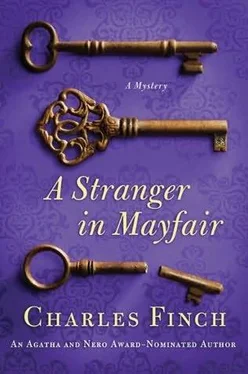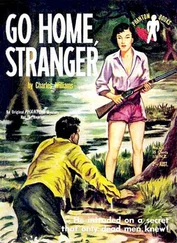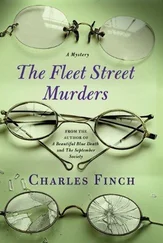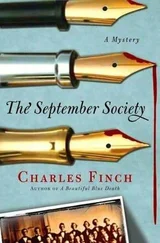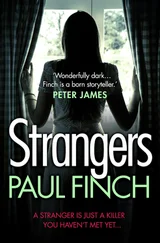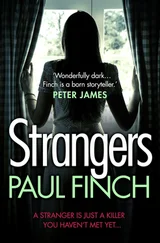Charles Finch - A Stranger in Mayfair
Здесь есть возможность читать онлайн «Charles Finch - A Stranger in Mayfair» весь текст электронной книги совершенно бесплатно (целиком полную версию без сокращений). В некоторых случаях можно слушать аудио, скачать через торрент в формате fb2 и присутствует краткое содержание. Жанр: Исторический детектив, на английском языке. Описание произведения, (предисловие) а так же отзывы посетителей доступны на портале библиотеки ЛибКат.
- Название:A Stranger in Mayfair
- Автор:
- Жанр:
- Год:неизвестен
- ISBN:нет данных
- Рейтинг книги:3 / 5. Голосов: 1
-
Избранное:Добавить в избранное
- Отзывы:
-
Ваша оценка:
- 60
- 1
- 2
- 3
- 4
- 5
A Stranger in Mayfair: краткое содержание, описание и аннотация
Предлагаем к чтению аннотацию, описание, краткое содержание или предисловие (зависит от того, что написал сам автор книги «A Stranger in Mayfair»). Если вы не нашли необходимую информацию о книге — напишите в комментариях, мы постараемся отыскать её.
A Stranger in Mayfair — читать онлайн бесплатно полную книгу (весь текст) целиком
Ниже представлен текст книги, разбитый по страницам. Система сохранения места последней прочитанной страницы, позволяет с удобством читать онлайн бесплатно книгу «A Stranger in Mayfair», без необходимости каждый раз заново искать на чём Вы остановились. Поставьте закладку, и сможете в любой момент перейти на страницу, на которой закончили чтение.
Интервал:
Закладка:
“Good Lord,” said Dallington. “It looks like an heirloom.”
“I should think so. It’s shined smooth from use on the outside.”
“What is it?” asked Ludo, still in the hallway.
“You can come in,” said Lenox.
“I’d rather not.”
The detective flipped the ring. On the reverse of the griffin were two initials: LS. “I think perhaps you’d better,” he called out to Ludo.
“What is it?”
Lenox went to the hallway, holding the ring up between his thumb and middle finger. “Does it look familiar?”
For a long time Ludo peered at the ring uncomprehendingly. “What is it?”
“I believe it’s your ring. Unless there’s another LS in the house.”
Realization dawned on Ludo’s face. “The thieving bastard! That’s an old Starling family ring. I had it engraved when I was at university.”
“You didn’t give it to him?”
“Give it to him! Never in a century of Sundays!”
“Then I’m afraid he may have stolen it. I’m surprised, however. Would his duties as a footman have taken him near a jewelry case?”
“Anything’s possible.”
Lenox frowned. “Perhaps somebody else took it and put it here.”
“It even could have happened after Clarke’s death,” said Dallington.
“Yes.” Lenox examined the ring, holding it an inch from his eye. “Ah-or perhaps not,” he said.
“Why not?” asked Ludo, still in the hall.
“There’s another engraving, on the bottom inside of the ring, opposite your LS. FC. ”
“Frederick Clarke,” said Dallington.
Lenox nodded.
“The ruddy nerve,” said Ludo.
“Did you wear it often?”
“That? No. That doesn’t mean I intended it as a present for a footman.”
Lenox peered around the room, the ring now in his clenched fist. He gave the bed a tentative prod and thought over what he had seen. From the kitchen a sound of heavy washing filled the room’s new silence.
“It’s strange,” he said. “A strange room.”
“Why?” asked Dallington. “Strikes me as in the normal run of things for a footman.”
“Does it really? It’s extremely spartan, for one thing. I doubt the other servants’ rooms are as unadorned as this one. Could he possibly have been here four years and left so little a mark?”
“Perhaps he moved between rooms?”
“I doubt it. Ludo?”
“No, I don’t think so.”
“I think he’s one of those people who lives a life of the mind. Did he often take books of this sort from your library?”
“Yes, quite regularly according to Collingwood.”
“Yet contrast that with this ring.” Lenox held it up again. “Why take such a personal bauble for himself? From everything this room has to show, he cared nothing at all for physical comfort or ornament, but this is what he chose to steal?”
“Worth a damn lot of money,” said Ludo.
Lenox shook his head. “No. It’s not about the money. He engraved his initials on it. That shows he valued it.”
Dallington said, “Of course.”
“Something odd was happening in this young man’s life. Intelligence combined with menial labor…I wonder, is it possible he had found his way into crime?”
“Of course he had,” said Ludo. “My ring.”
“Not that, no. Think: a well-tailored suit, a signet ring…it looks to me as if he might have been playing the young aristocrat. Some scam or other, couldn’t it be?”
“Perhaps that’s why he reads,” added Dallington excitedly. “To impress people-to seem like a varsity man!”
“I say, could I have that ring back?” said Ludo.
“Of course, here it is.”
After handing Starling the ring, Lenox stood in the doorway of the room for a long time, thinking. Nobody spoke. The rhythmic sound of washing-what must have been the sound of Frederick Clarke’s life-wore on like the blank, unvarying noise of an ocean.
“Something deep is happening here,” said Lenox. “Deeper than I realized at first.”
Chapter Ten
An interview with Jenny Rogers left Dallington perhaps half in love-she was extremely soft-spoken, with an endearing way of furrowing her forehead to show how intently she was listening-but yielded little helpful information. What was most interesting to Lenox was that she seemed genuinely sad to have lost her friend. It made Frederick Clarke more real, made his death seem graver, when she talked with a smile on her face about him.
She had been working at the Starlinghouse for a year. “I’ll never forget,” she said, “at the end of my first week he took a piece of the cake they was having upstairs-Mr. Starling’s cake,” she added, remembering he was there, “and put a candle in it for me. ‘Happy first week,’ he said.”
As far as she could recall, she had never seen him wear a gray suit or a gold ring, or indeed anything other than his footman’s livery. He always had his nose in a book.
She had oberved occasionally in the past that he had scrapes on his hands.
“Occasionally,” murmured Lenox after she had been dismissed down the opposite hallway (the staff were segregated in their sleeping quarters, men down one hall and women down another). “If it was an ongoing condition it means there’s no significance in their directly preceding his death.”
“They still might be related.”
“Perhaps.”
Betsy Mints was even less helpful than Jenny Rogers. A small, thick woman, she had a deeply stupid face that was red from the constant heat of cooking over fire. In conversation, however, she was witty enough, in a voluble northern way. Her experiences with Frederick Clarke were extremely limited. She thought he was quite handsome, very efficient, and rather rum-quiet, inward, that is to say-but that was the extent of her analysis of his character.
Lenox had higher hopes for Jack Collingwood, the young butler. For one thing he directly supervised Clarke. Lenox and Dallington sat at a table with him while Ludo hovered anxiously behind.
“I apologize for the lateness of our meeting,” said Lenox.
“Not at all, sir.”
“It’s nearly ten o’clock. You must be off soon.”
“Yes, sir.”
“From what I understand, Frederick Clarke was a good footman?”
“Entirely blameless in the conduct of his professional duties, sir.”
“Did you like him?”
“Like him, sir?”
“Were you friends?”
“No, sir.”
“What was your impression of his character?”
“Mr. Clarke was quiet and studious. He preferred to be in his room, reading, if he had spare time. He spoke to me once or twice about going back to school. I dissuaded him from it, of course. He was excellent in his work and could have risen to be a butler in due time.” This said as if there could be no higher conceivable ambition.
“Who do you think killed him?”
“I have no idea whatsoever, sir. A vagrant, I might venture.”
“But to what end? Did he carry money?”
“No, sir. He and I both have our wages deposited in Mr. Starling’s bank, and I never saw Mr. Clarke spend his on anything. As for household money, that is my province exclusively.”
“What was his day off?”
“Thursday, sir.”
“That’s all?”
“The family eats a cold collation after church services, following which the servants have Sunday afternoon to themselves.”
“Did he leave the house or stay in?”
“Left, sir, invariably. That’s quite usual, however.”
“Did you ever see him wear a gray suit?”
“No, sir.”
“Or wearing a gold ring?”
“No, sir.”
“Did you ever celebrate his birthday?”
“No, sir.”
“And you saw cuts or scabs on his hands?”
“Yes, sir. I reprimanded him once-his only reprimand-for having unsuitable hands. Of course under his white gloves it didn’t matter, but then it’s the principle of the thing, I believe.”
Читать дальшеИнтервал:
Закладка:
Похожие книги на «A Stranger in Mayfair»
Представляем Вашему вниманию похожие книги на «A Stranger in Mayfair» списком для выбора. Мы отобрали схожую по названию и смыслу литературу в надежде предоставить читателям больше вариантов отыскать новые, интересные, ещё непрочитанные произведения.
Обсуждение, отзывы о книге «A Stranger in Mayfair» и просто собственные мнения читателей. Оставьте ваши комментарии, напишите, что Вы думаете о произведении, его смысле или главных героях. Укажите что конкретно понравилось, а что нет, и почему Вы так считаете.
